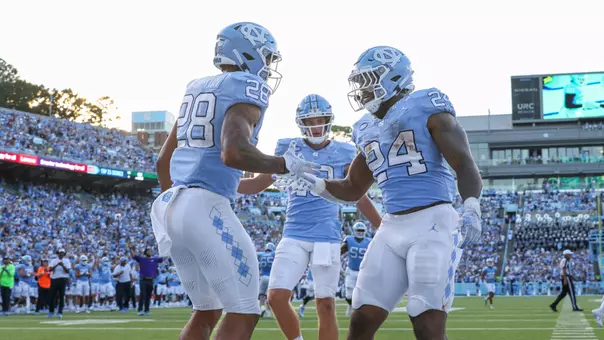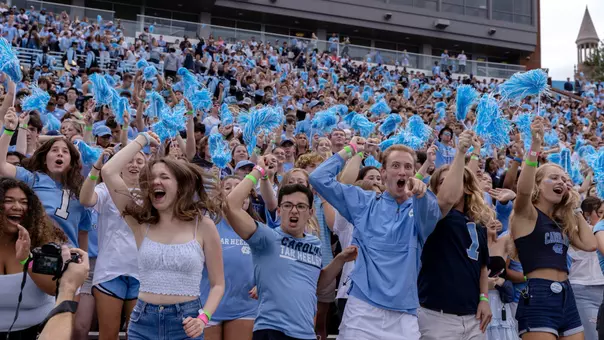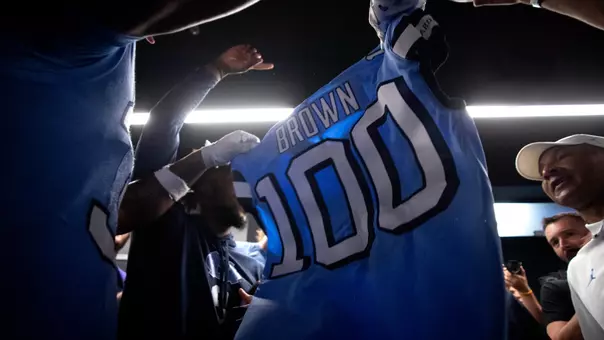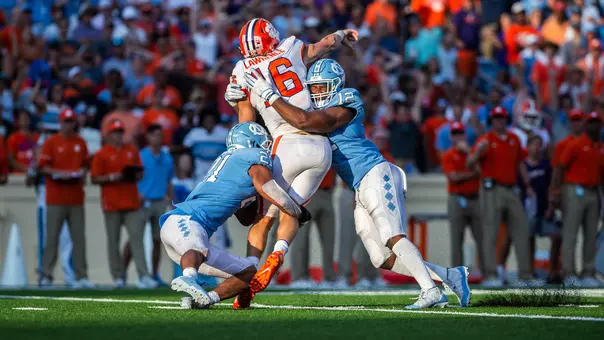University of North Carolina Athletics
EXTRA POINTS SPECIAL: John Bunting: The Final Turns In The Coaching Carousel
May 22, 2001 | Extra Points
May 8, 2001
Part I: Introduction (March 26, 2001)
Part II: The Early Days (April 2, 2001)
Part III: The Carolina Years (April 9, 2001)
Part IV: On the Wings Of An Eagle (April 16, 2001)
Part V: A Coach Is Born (May 1, 2001)
John Bunting collects lessons like some people compile stamps or coins or matchbooks. He faces them, learns from them, saves them. One lesson hangs beside his office door on the fourth floor of the Kenan Football Center, just up the wall and over from the colorful and bubbling fish tank. It's nondescript as wall-hangings go--particularly in this environment of rich cherry paneling--consisting of two black-and-white photos in a modest frame. But it can't help but catch your eye as you walk through the door, into a small parlor and the outer office.

|
Standing in his office in April, 2001, two days following the Tar Heels' spring Blue-White scrimmage, Bunting points to each of the football players in the photographs and tells the story. Shown from the 1995 season are side-angle and end-zone angle photo prints of a play between the Denver Broncos and the Kansas City Chiefs, the team that employed Bunting from 1993-96 to coach its linebackers. Bronco tailback Terrell Davis is nearing an opening in the line of scrimmage en route to a 65-yard touchdown. A number of Chief defenders got beat or flat missed their assignments on the play.
Gunther Cunningham, the defensive coordinator, turned to Bunting in the coaches' booth high above the field and screamed at the top of his lungs, "What the f--- are your f------ linebackers doing?"
Bunting says Cunningham lost it, that he went on and on, berating Bunting and the play of his linebackers. Bunting can point calmly today to each of the Chiefs' players and the mistakes they're making, including one nosetackle who was double-teamed and two safeties who missed open tackles.
"It was a team loss," Bunting says. "A lot of players screwed up. But Gunther ranting like that was a distraction. You couldn't focus on the next play. He was still hot 10 minutes later.
"This is a constant reminder of how stupid you can be on game day. I like to yell and scream, but not on game day. The only thing I'll get upset about on game day was what I did to one of our kids on Saturday. There was a flag he didn't like and he gave the official a `thumbs-down' sign. I yanked his ass out real quick. I won't stand for that. They cannot act like jerks. It's not going to happen.
"I will not scream and yell at players or coaches on game day, unless someone acts stupid. There's a place for that. But not on game day."
Those and other lessons like them are filed in the Bunting mental scrapbook as he embarks on this journey as Carolina's new football coach. But perhaps more than any chapter in his life, Bunting's eight-year stint as an assistant coach in three NFL cities is less what the man is about than the others.
There was more money and prestige coaching in the NFL than at NCAA Division III, where he'd been previously. There was national television. Stadiums with 75,000 fans each Sunday. A sexier lifestyle with chartered jets and all the trappings that come with the highest level of the game. Real fame is in the NFL.
But playing the game is what Bunting was always about.
Second is teaching it to kids, to young people who aren't yet making so much money they've lost track of the game's essence, its fun and its challenge.
"I didn't enjoy pro coaching as much," Bunting says. "The salary cap, player issues were quite a bit different from college. There are a lot of million-dollar players who think they know a lot more than you. Guys like Derrick Thomas, God rest his soul, they were difficult to deal with.
"Coaching guys who were in college without scholarships, playing only because they love the game, that was special."
There were, nevertheless, some interesting times along the way.
Memories are long in professional football, and John Bunting always worried that his anti-management role in the 1982 players strike would come back to haunt him if he ever tried to get a job as a coach with an NFL team. He figured the opportunity, if it developed, would come from one of three sources. Dick Vermeil, his coach with the Philadelphia Eagles from 1976-82, might get back into coaching and offer him a job. Carl Peterson, a longtime administrator with the Eagles and USFL Stars now in management with the Kansas City Chiefs, might present an opportunity. Or Jim Mora, Bunting's coach with the Stars in 1983-84 and in 1992 the New Orleans head coach, could offer a job.
But as the early 1990s unfolded, Bunting was happy and content coaching football at Glassboro State College, a 20-mile drive from Philadelphia. The only job he really coveted was the head coaching position at his alma mater, but the Tar Heel program looked ship-shape for the long haul under Mack Brown. Bunting's new wife, Dawn, was the women's basketball coach at Glassboro. They made decent money and Bunting had invested well from his days in the NFL--albeit a period before the gargantuan salaries of today. And they were both winning. John's football team was 12-1 in 1992, and Dawn's basketball team was 23-5 in 1992-93.
In the summer of 1992, the door to the NFL opened. Peterson gave Chiefs coach Marty Schottenheimer Bunting's name as a possibility to serve as one of a handful of extra coaches the team imports each July for its preseason training camp. Bunting spent three weeks in River Falls, Wis., and enjoyed the experience. The following January, Peterson and Schottenheimer decided to make some defensive staff changes and talked to Bunting about a job as linebackers coach. The Chiefs offered, Bunting accepted, and in late February, Bunting resigned at Glassboro State, which was now known as Rowan University.
The fact that his two children from his first marriage, Kim and Brooks, were now out of high school was integral to the decision. Bunting didn't want to leave the Delaware Valley until they were in college.
"I didn't know if I'd get another opportunity," Bunting says. "I felt my options would be limited. If I was going to give the NFL a shot, this was the time to do it."
The idea, though, took a little time to grow on Dawn, a born-and-bred Philadelphian. She didn't even realize at first that Kansas City was in the state of Missouri.
"Kansas? Kansas?" she exclaimed to John at first. "Okay, so what are Dorothy, Toto and I supposed to do?"
It developed into a terrific experience.
Kansas City is known around the NFL as one of the better places to work. The Chiefs' franchise has longtime ownership stability in Lamar Hunt. Peterson, the president and general manager, has been there 12 years. The team has a football-specific ballpark, Arrowhead Stadium, and the city revolves around the Chiefs from August through January. The city is clean, there are good restaurants and, as the Buntings would find, the people are friendly.
"I first went to the grocery store, and the lady at the checkout counter says, `Did you find everything?' I'm like, `Why do you want to know?'" says Dawn. "The Midwest mentality grew on you. People were nice. They weren't always in a hurry. Back east, you're always in a hurry to get nowhere. Hurry up and wait. Hurry up and wait. It was different in Kansas City. They were four wonderful years."
Dick Vermeil's return to coaching in January, 1997, with the St. Louis Rams set the Buntings on yet another course. Bunting and Schottenheimer had talked during quiet moments about career goals and dreams. Bunting told him he'd always wanted to return to Chapel Hill.
"The funny thing was, Marty said to me, `You know, if I ever got into college coaching, North Carolina is place I'd like to be,'" Bunting says, finding it ironic that in 2000 his competition for the Tar Heel job included the very same Marty Schottenheimer.
Bunting also wondered what would happen if Vermeil, his mentor for seven years with the Eagles, ever got back into coaching.
"Marty said when he'd gotten the chance years earlier to coach under his mentor, Bill Arnsparger, that he'd jumped at it," Bunting says. "When Dick called me, Marty agreed with me. It was something I had to do."
So the Buntings moved to St. Louis and Bunting became linebackers coach under defensive coordinator Bud Carson, a man with Carolina connections. Carson was an assistant in Chapel Hill from 1957-64 under Jim Tatum and Jim Hickey and had developed a name as a defensive mastermind in several NFL stops. Carson was interested in the Tar Heels' head-coaching job when Dick Crum left in 1987 and Brown was hired.
Vermeil & Co. had lots of work to do to resurrect the Rams, who had floundered since moving from Los Angeles in 1995. The 1997 and '98 seasons were brutally difficult, with St. Louis posting records of 5-11 and 4-12. Entering the 1998 season, Vermeil had a difficult decision to make with the retirement of Carson. Who best to become defensive coordinator? He made a decision that many observers questioned--he named secondary coach Peter Giunta and Bunting co-coordinators, giving Giunta, who'd been in the NFL two years longer than Bunting, a 51 percent stake.
"I wanted some of Bud's demeanor on the field--he was kind of half ornery all the time, could be very blunt and to the point and leave no room for argument," Vermeil says. "John has some of that in him. I also wanted his thumbprint on the front seven--the scheme and technique and temperament that you needed. But I knew that Peter understood the defense from the secondary forward better than John.
"So I decided to make them co-coordinators, blending the abilities that each had. Everyone laughed at me, but they did an unbelievable job. We were sixth in the league in defense 1999. We won our division title, the NFC and the Super Bowl because of defense. It wasn't the offense."
Many of the Rams' problems would be solved in 1999 with the emergence of new talents on offense--QB Kurt Warner, receivers Torry Holt and Isaac Bruce and running back Marshall Faulk. Combine that with the defense co-authored by Giunta and Bunting--the latter providing the fire, the former the ice, to many observers' view--and the result was a 13-3 season and Super Bowl win over Tennessee.
The victory for the Rams was sealed with Mike Jones' tackle of Titan receiver Kevin Dyson just shy of the goal line on the last play of the game.
Jones was a linebacker, the preserve of John Bunting.
Jones is the player singled out by Vermeil as being the one Bunting most influenced during his tenure with the Rams.
"Mike became like JB had been as a player," says Carl Hariston, a teammate of Bunting's in Philadelphia in the 1970s and fellow Rams assistant in 1999. "He watched film after practice, he stayed late at night, was in the office early in the morning. Mike understood the game plan better than anyone. He could recognize what was happening on the snap. He made a great read and a great play. And we won the Super Bowl."
Four days after the Super Bowl triumph, John Bunting's world became unraveled.
First, he had a dangling contract issue with Rams' management. Bunting told Vermeil in December that he didn't think the team's offer of a two-year contract extension with a $10,000-a-year raise was fair. He believed he had earned a bigger raise given the performance of his linebackers and the defense overall. But he didn't want to negotiate until after the season. Several weeks later, just before the Super Bowl, Vermeil told Bunting he'd talked to the club's power-brokers and was optimistic "we can work the deal out." But there'd been no time to do so since the Super Bowl, and on the Tuesday following the Super Bowl victory, Vermeil announced his retirement.
Mike Martz, the Rams' offensive coordinator, was quickly named head coach the following day. Bunting believed and told the St. Louis beat writers that the appointment was a good one, that he looked forward to continuing to work toward many more Ram victories. Bunting did not consider himself to be a candidate for Vermeil's job, but he was open to opportunities to become a coordinator somewhere. A year earlier, he'd talked with Gunther Cunningham, now the head coach at Kansas City, and George Seifert, the new head coach of the Carolina Panthers, about coordinators jobs with those teams.
"I'd worked closely with Mike Martz all year," Bunting says. "I admired his work. He did an exceptional job. I was happy for Dick that he'd retired, happy for Mike that he'd gotten the job."
The next day, Martz approached Bunting and told him he didn't like having the co-coordinator system, that he was thinking of naming Giunta sole defensive coordinator. Bunting balked at the idea.
"The arrangement had worked pretty doggone good," Bunting says. "We were sixth in the NFL in total defense, No. 1 in run defense, which is what I was in charge of. Why would you want to tinker with that? It wasn't broken. Why fix it? I voiced my concern and objection to Mike. He said he would possibly reconsider it."
Then they talked about Bunting's unsigned contract. Bunting told Martz that Vermeil had said he'd try to get it taken care of. Martz shot back, "Dick's not here anymore." They agreed to talk again on Friday.
Bunting's instincts gnawed at him on the drive from Rams Park to his home in St. Charles. The vibes were not good. He decided he needed to begin exploring other jobs. He knew he might not be long for the Rams.
That night, Dawn and John attended a farewell dinner for Vermeil. Over drinks, one assistant coach said to Dawn, "I'm sorry to hear about John." She was stunned at the comment but kept it to herself until Friday morning, when she told her husband.
Bunting immediately called Martz and relayed to him what Dawn had been told. Martz first was angry that word had traveled that route to the Buntings. Then he admitted he was going to stay with Giunta as coordinator and that management wouldn't budge on the salary increase.
"I know you'll be unhappy about it, and it'll probably fester," Martz said. "That won't be good for either of us. I'm going to have to let you go."
Early February is not the best time to be looking for work in the NFL. Firings and hirings commence in December among teams not in the playoffs, and other clubs fall out of competition as January unfolds. Most new hires are made by mid-to-late January. Bunting knew he had to act fast.
He hung up with Martz around 9 a.m. and began working the telephone. He called Green Bay, where new coach Mike Sherman was putting a staff together, Sherman had completed his staff earlier in the week. He called back to Kansas City for Cunningham and was told he was a day late, that Cunningham had filled a position on Thursday.
Bunting talked to Rams offensive line coach Jim Hanifan, who's friends with New York Jets coach Al Groh, who was looking for a linebackers coach. The idea of working for the Jets was appealing since it would be back on the East Coast, closer to Bunting's parents in Maryland and his children in the Philadelphia area. "You'd love working for Al Groh," Hanifan said. "I'll call Al and cut through the red tape for you."

Jim Haslett celebrate a victory last fall in New Orleans' Superdome. |
"So Mike Martz fires John," Dawn says. "Big deal. John was out of work for 45 minutes."
But before he accepted, Bunting said he wanted to talk to Groh.
"Just let me know by 6 o'clock," Haslett said. "I'm leaving town and want it settled by then."
The teams and the personalities aside, New York and the East Coast were preferable to Bunting. He lost as a Tar Heel in New Orleans--at Tulane in 1970. He lost as a Philadelphia Eagle in New Orleans--to Oakland in the 1981 Super Bowl. "I was never a big fan of New Orleans," he said. "It just seemed to have bad memories for me."
Bunting waited all day for Groh to call back. Groh's secretary promised that a phone call was imminent. She apologized for Groh still being involved in interviewing candidates when Bunting would check back periodically. Bunting did in fact speak to Groh at one point in the afternoon. Groh apologized for the delays and said he had one more matter that needed his attention, that he'd call back in 45 minutes. Groh never called.
At 5:45, Bunting dialed Haslett's number and said he was coming to New Orleans.
"What if Al Groh calls back?" Haslett asked.
"That's over," Bunting said. "I'm a Saint."
Isn't it interesting, Bunting is asked, that Groh is now the head coach at the University of Virginia?
"Not only that," Bunting says, "I'm convinced that if I'm not at New Orleans last year, I'm not sitting here in Chapel Hill today."
Dawn Bunting seconds that notion. But each has a different reason for the opinion.
Dawn believes that it took a special man in Jim Haslett to set aside NFL standard-operating-procedure of not allowing an assistant coach under contract to talk with a potential employer about a job until season's end. Haslett, though, understood the Carolina job was Bunting's lifelong dream and allowed Bunting sufficient leeway to meet with Dick Baddour in early December, to travel to Chapel Hill to interview for the job, and to vacate his contract before season's end. Haslett had to run interference for Bunting with Saints' owner Tom Benson, who was more concerned about the upcoming playoffs.
"Jimmy was phenomenal," says Dawn. "Many coaches wouldn't have allowed it. Jimmy said he'd do anything to help. I firmly believe that if we're not in New Orleans last year, we're not here today."
John echoes those sentiments and will be forever grateful to Haslett, as well as to Saints general manager Randy Mueller. But he thinks there was another angle at work as well.
Bunting believes it was significant that, when Carolina went looking for a new coach, he happened to be coaching in the city that is now the home of former Tar Heel teammate Paul Hoolahan, that Hoolahan's influence was significant in getting him an interview with Baddour. Hoolahan, now executive director of the Nokia Sugar Bowl, worked alongside Baddour in Carolina's athletics administration under AD John Swofford for four years. Baddour and Hoolahan remain friends.
"There's no doubt in my mind, if the thing doesn't happen with Mike Martz, I'm not in Chapel Hill today," Bunting says. "By virtue of that, I go to New Orleans and get to show all over again that I'm a good coach, and I can show it in front of someone close to Dickie Baddour. Paul had been in New Orleans a few years, he'd seen the Saints flounder, he'd seen an undisciplined team, he'd seen the circus act with Mike Ditka.
"Paul was a year older than me, but he knew how I played. He knew I was disciplined, that I had to be to last 11 years in the NFL. He sees Haslett with a new staff turn things around. I truly believe Paul helped open the door for me. A lot of people were knocking. Dick Vermeil called. Ron Jaworski called. John Cowell, Mike Mansfield, Don McCauley all called. Probably many more. Paul asked me, `Do you want that job?' I said, `I sure do.' Maybe I still get the interview anyway. But I'll always believe that having Paul working for me got the door open all the way."
An interview.
That's all everyone in John Bunting's court ever thought he'd need to get the head coaching job at Carolina.
"I thought all along with John and Carolina that the difficult thing would be to get in the door and get an interview," says Jim Bunting Jr., John's older brother. "Once he did that, he would sell himself. That's pretty much what happened."
When Virginia Tech coach Frank Beamer reneged on a handshake agreement to take the job the Monday after Thanksgiving, 2001, Baddour started from a clean slate. With former Tar Heel players phoning and faxing en masse, with Swofford, now commissioner of the ACC, and Hoolahan recommending Bunting get a close look, Baddour called Bunting. They set up a meeting in New Orleans on Saturday, Dec. 2, the day before the Saints were to play Denver in the Superdome. Baddour flew in a private plane to New Orleans, where Bunting picked him up and drove to a restaurant near the Saints' headquarters. Over bowls of steaming gumbo in a restaurant named Winners, they talked. The meeting lasted about three hours.
Baddour was still talking to other candidates, among them, ironically, the very same Marty Schottenheimer who had given Bunting his entr?e into the NFL. But he told Bunting he had a good feeling when he left.
"I came away from that meeting very, very excited," Baddour says. "I knew at that moment that Carolina football would be fine. Here we had a candidate who was very interesting. I knew the competition would have to beat him out. If not, our program would be in fine hands with John Bunting."
Postscripts to the Martz/Giunta/Bunting story:
1. The Rams' defense falls to last among 31 teams in the NFL in points allowed in 2000.
2. Bud Carson is rehired out of retirement for two months and becomes co-coordinator with Peter Giunta.
3. Mike Martz admits his handling of the coordinator's position the winter before had been a mistake.
4. The coaching merry-go-round continues in January, 2001. Martz fires Giunta, who then is hired by Dick Vermeil after Vermeil becomes Kansas City's new head coach.
5. The resum? stops in Chapel Hill for ex-Tar Heel John Bunting.
Editor's Note -- This is the last of six parts in this special series profiling John Bunting. These chapters as well as additional material--and a foreword from Dick Vermeil--will be presented in a special soft-cover print edition this summer. Watch TarHeelBlue.com for more details.
Lee Pace, editor and publisher for 11 years of Extra Points, a newsletter devoted to the careful study of Tar Heel football, has interviewed dozens of family members, former teammates, players and coaches who have touched and been touched by Bunting for this exclusive series of articles. From his youth in Silver Spring, Md., to his days as a Tar Heel from 1968-71, from his days as a Philadelphia Eagle to his start in the coaching business at Rowan University, "The Bunting Era Dawns For Carolina" helps you relive the influences and special moments that have shaped Bunting's life.
Part I: Introduction (March 26, 2001)
Part II: The Early Days (April 2, 2001)
Part III: The Carolina Years (April 9, 2001)
Part IV: On the Wings Of An Eagle (April 16, 2001)
Part V: A Coach Is Born (May 1, 2001)
Thanks to the following businesses and individuals who have helped fund this series on John Bunting:
UNC Dept. of Athletics
The Educational Foundation Inc.
Gayle Bomar, IJL Wachovia
John Anderson, General Shale Brick
Paul Miller, Quixtar
John Cowell, The Home Team




